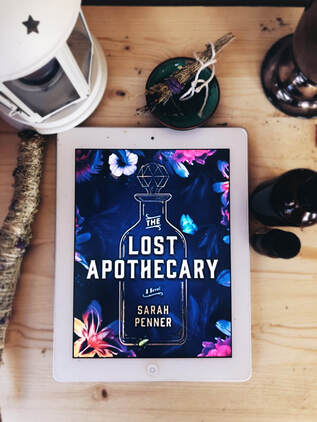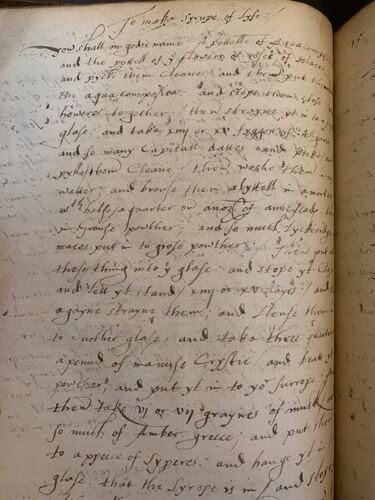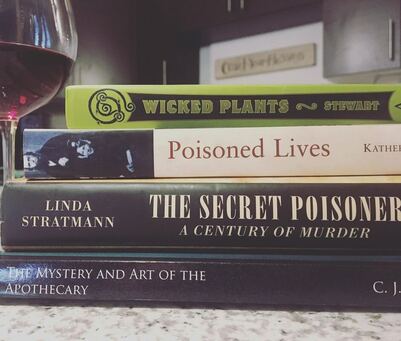 This week we are diving into the beautiful debut novel by Sarah Penner, The Lost Apothecary. Both of us got this book as a digital Arc through Netgalley and it was actually Ashli’s first arc through this service all because of Erin’s insistent texts with bits of the tale. We knew that we had to talk to Sarah so our personal reviews are going to be brief and then we will dive straight into our conversation with Sarah about her research into this time period and herbology as well as try to tease some information about upcoming projects out of her. Don’t stop scrolling though because at the very end Sarah gave us a couple photos of her research materials that we can share with all of you! Without further ado, The Lost Apothecary… “Rule #1: The poison must never be used to harm another woman. Rule #2: The names of the murderer and her victim must be recorded in the apothecary’s register. One cold February evening in 1791, at the back of a dark London alley in a hidden apothecary shop, Nella waits for her newest customer. Once a respected healer, Nella now uses her knowledge for a darker purpose—selling well-disguised poisons to desperate women who would kill to be free of the men in their lives. But when her new customer turns out to be a precocious twelve-year-old named Eliza Fanning, an unexpected friendship sets in motion a string of events that jeopardizes Nella’s world and threatens to expose the many women whose names are written in her register. In present day London, aspiring historian Caroline Parcewell spends her tenth wedding anniversary alone, reeling from the discovery of her husband’s infidelity. When she discovers an old apothecary vial in the River Thames, she can’t resist investigating, only to realize she’s found a link to the unsolved “apothecary murders” that haunted London two centuries ago. As she deepens her search, Caroline’s life collides with Nella’s and Eliza’s in a stunning twist of fate—and not everyone will survive. With crackling suspense, unforgettable characters, and searing insight, The Lost Apothecary is a subversive and intoxicating exploration of women rebelling against a man’s world, the destructive force of revenge, and the remarkable ways that women can save each other despite the barrier of time.” A: I absolutely adored this book but it could have just been my insane love of history and murderesses talking. The atmosphere that Sarah Penner weaved through her debut novel was so eerie whether it was 1791 or present day that I had goosebumps through a good portion. Goosebumps automatically mean a star on my ratings because it is hard to give me goosebumps. Even though I am not in the exact same shoes of the present day character, Caroline, I related to her so much because I would have gotten myself so invested in exploring the story of this apothecary. As much as I wish to say that I would be like Nella and Eliza, that side of me is best saved for tabletop rpgs and my own writing. Five out of five stars for this one.
E: Agreed ! I think I could see myself being Nellie- wanting to help women… even if it does mean murdering their husbands. The historical nuances in this book were stunning; the time period wrapped itself around the story seamlessly. I never felt bogged down by too many details or the dreaded “info dumps”. I actually couldn’t believe this was a debut! It was fantastic and one of my absolute favourites of the year . I remember sending Ashli screenshots of paragraphs that I thought were beautifully written, telling you to hurry and catch up since I received the ARC first. I devoured this book with plenty of tea beside me . This novel with Britain as the background has me reaching for copious amounts of cream of earl grey. BT&W: With this being a historical novel, that must have required a lot of research. Did that work of researching the time period and have it connect to your story energize you or exhaust you? SP: I absolutely loved the research process - and in fact a love of research is why many historical fiction authors choose to write histfic! I spent time in the British Library scouring old manuscripts and druggist diaries; I reviewed digitized pharmacopeias; and I studied extensively some well-known poisoning cases in the eighteenth and nineteenth centuries. I was surprised by the number of plants and herbs that are highly toxic, and I was fascinated while reading about the clever, if ineffective, remedies used by the predecessors of modern-day pharmacists. BT&W: Through this research, are there any fun facts that didn’t make the book that you could tell us about? SP: There are so many herbs, plants, and poisons that didn’t make it into the book due to lack of space, but the one thing that got “cut” during edits that I’m still a bit sad about was a scene where my character goes on an “unsolved mystery” tour through London. Maybe someday, I’ll work that tour into another story. BT&W: What was the inciting moment that had you choose this time period and this story line in the first place? SP: I’ve been studying 18th-century (Georgian) London for many years; my bookshelf is teeming with volumes on the subject. It was such a scandalous era, yet authors don’t seem to write much about it—which I think is a missed opportunity! It was a time of brothels, corrupt police, the Gin Craze, terrible diseases, and a king suffering from recurrent bouts of mania. Lucky for me, it was also the perfect era to set a story about a poisoner apothecary, and here’s why. Until the mid-19th century, death examiners were unable to detect the presence of poison when performing autopsies; forensic toxicology did not yet exist, and thus poisoning homicides are rarely mentioned in 18th century bills of mortality. So, setting my story in late 18th-century London meant the apothecary could “get away” with her sinister behavior; even fifty years later, the poisons she dispensed would been identified during an autopsy. BT&W: If you were living during the same time period as your characters, do you think you would have gone to the apothecary yourself? And what would 1700’s Sarah Penner possibly be like? SP: Gosh, what a great question! I hope I wouldn’t have needed to visit the apothecary, because that would mean someone had really ticked me off! And 1700s Sarah would probably be similar to present-day Sarah...a lover of books, writing, adventure, and wine! But more “boundaries” existed for women in the 1700s than today, so I probably would have been more misbehaved and rebellious than I actually am. BT&W: You’ve got three POV’s in this novel. Did you always know that you wanted to have these three women’s voices and what was that process like going between three very different characters? SP: I chose dual timelines and multi-POV for a very simple reason: I like withholding information from the reader, and multiple timelines/characters allows an author to do just that. We’re able to “drip-feed” suspense through the story, switching characters or timelines at precisely the moment that you, as a reader, want the information the most. BT&W: Which of the three narrators do you identify with the most and why? SP: Definitely Caroline; there are SO many similarities between her and myself. We both love history and the city of London, and have had to ask ourselves tough questions about happiness vs. fulfillment. BT&W: I (Erin) am fascinated by herbs and educate myself on herbalism in my spare time. Maybe one day I’ll be brave enough to identify as a witch. Do you have a particular interest in herbalism and witchcraft like the characters do? SP: Not witchcraft, but I’m a strong believer that we overuse western medicine. I think many natural things are effective in treating everyday ailments or issues. For instance: the best remedy for itchy bug bites is simply tea tree oil - forget expensive tubes of hydrocortisone. And to fall asleep or relieve stress, valerian root or skullcap tea works wonders. I wish people would better inform themselves about how many wonderful, natural remedies exist. BT&W: As an avid lover of herbs, I (Erin) often create my own teas. Do you have a go-to tea to drink while you work, or one you find that matches the vibe of “Lost Apothecary”? SP: I always start my day with two cups of coffee. But mid-afternoon, I often go for herbal tea. My favorites include peppermint and chamomile. But for someone reading The Lost Apothecary, I’d recommend London fog (black tea with bergamot, lavender, and vanilla) with a splash of cream! BT&W: Both Erin and I (Ashli) have pets who are our best friends and perfect reading/ writing partners. Can you tell us about your reading and writing partners in crime? SP: Yes! We have a 6-year old miniature dachshund named Zoe. She is always right next to me, happily napping away, while I write. I can honestly say she’s been by my side while writing every page of The Lost Apothecary. BT&W: What is your next project like and what would be your dream project? SP: I can’t share too much about it, but my next project will have many of the elements readers have come to love in The Lost Apothecary, including an atmospheric historical setting; strong, rebellious women; a speculative element; and plenty of twists and cliffhangers. I do also have a dream project that I want to pursue someday when I’m more established; I don’t want to give away any details, but the genre is fantasy and I hope to donate all proceeds from that book to support wildlife rescue and animal shelters. So, perhaps that’s a clue… BT&W: Do you have any advice to future writers, both for any genre of fiction as well as for historical fiction specifically? SP: For historical fiction writers, the most important thing to remember is that although you LOVE the research and minutiae of whatever you’re studying, readers don’t want this level of detail; they want just enough to ground themselves in the era/setting, and not a drop more. I’d say about one percent of what you research should actually land in the book. Remember that story is key--and most of this will be invented by you--so give them the conflict, stakes, relationships, etc. and drip-feed that research throughout the course of the book. BT&W: What are you reading now, and what books might you recommend for readers who love The Lost Apothecary? SP: I’m currently reading CASTE by Isabel Wilkerson and an advanced copy of SHOULDER SEASON by Christina Clancy. Both are excellent! I also recommend two debut novels, both of which came out earlier this year: THE KINDEST LIE by Nancy Johnson, and WAITING FOR THE NIGHT SONG by Julie Carrick Dalton.
0 Comments
Leave a Reply. |
Categories
All
|


 RSS Feed
RSS Feed
